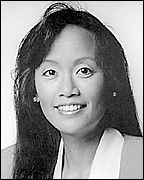

![]()
This Sunday


![]()
This Sunday
How’s Hawaii’s economy?
Depends on whom you askThese are challenging times. As one of the most open (dependent on imports and exports) economies in the United States, Hawaii is extremely dependent on the global economy. Some businesses are still recovering from an economic slump that lasted nearly a decade, and now the threat of war is creating more uncertainty.
So if you ask, "How's the economy doing?" the response is likely to differ, depending on whom you ask.
Business leaders like Mike O'Neill, chairman and CEO of Bank of Hawaii, say the state's economy is resilient.
"It comes as a surprise to lots of people, but Hawaii's economy is actually outperforming that of the mainland at this time. Our unemployment rate is about 4 percent, which is two full percentage points below that of the U.S. Our growth prospects for this year are about 2.5 to 3 percent."
O'Neill offers his own ideas on how to improve the economy.
"We have a comparative advantage in tourism, but I believe we can still do better. We need to nurture the military, which represents 10 percent of our state's economy, and make them feel at home here. Lastly, let's build new industries. There's a lot of promise in biotech research, high-tech and captive insurance."
O'Neill is hopeful the business climate will improve under the new administration "if we simplify the processes by which we approve new investments" and offer "well-structured tax incentives.
Sumner La Croix, chairman of the University of Hawaii economics department, says tax credits alone won't solve the problem. He says Hawaii needs to improve the full package, from transportation to housing costs and education.
"I think the state ought to re-focus on attracting interesting entrepreneurial people to the state," he says. "When you do that, you'll have them starting good firms."
UH economics Professor Carl Bonham says Hawaii's economy is a mixed bag, but overall it's improving.
"The tourism sector has not completely recovered from the impact of 9/11," he says. "Other sectors such as real estate, construction and the business of financing and refinancing mortgages have done much better than most people expected."
In his forthcoming book "Tourism and the Economy," UH economics Professor James Mak maintains "it's important for destinations like Hawaii to diversify, because over time tourism becomes a less important force in driving that economy."
For some, life is not so rosy.
"The frustration level is very high, because it's such a struggle to stay in business. Many people work two to three jobs," says Lowell Kalapa, president of the Tax Foundation of Hawaii.
And as the new governor and lawmakers grapple with balancing the budget, Kalapa believes, "it will take a long time for this administration to put together a strategy for turning the economy around."
Many, like Joy Kimura, are waiting for that to happen. Kimura and her husband were born and raised in Hawaii, but lived away for nearly a decade because they could not afford to stay here. They are expecting their first child in June. This is the third time Kimura has returned to settle down.
"Hawaii is such a beautiful place to live, but it's so hard to live here. Sometimes the sacrifices you make and the stress that comes with it makes me think it's not worth it."
Kimura recently lost her temporary state job due to a hiring freeze. She wonders how she and her husband will manage in Honolulu, one of the 10 most expensive cities in the nation. Even though Kimura has an international marketing background and is fluent in Japanese and Mandarin, she's out pounding the pavement.
"Some believe the economy has recovered. But I don't see any change. There aren't many decent-paying jobs. I take whatever's available so I can survive."
Wages for many jobs in Hawaii are much lower compared to the mainland. And the cost of gas, housing and medical care is rising. So why stay?
"It's more than the clean air and the clean water. It's the quality of life," says Kimura. "The people are friendly; it's a very welcoming environment."
It's hard to put a price on some things.
"There's nothing like watching the sun set on the ocean from a six-man outrigger canoe," says economist Mak.
"We have a word for that," he adds. "It's called 'real wage.'"
"Economists seem to have a word for everything," I say.
"We sure do," he says, pausing for a moment. "Otherwise, we'd be out of a job."
Heidi Chang is a freelance writer and producer.